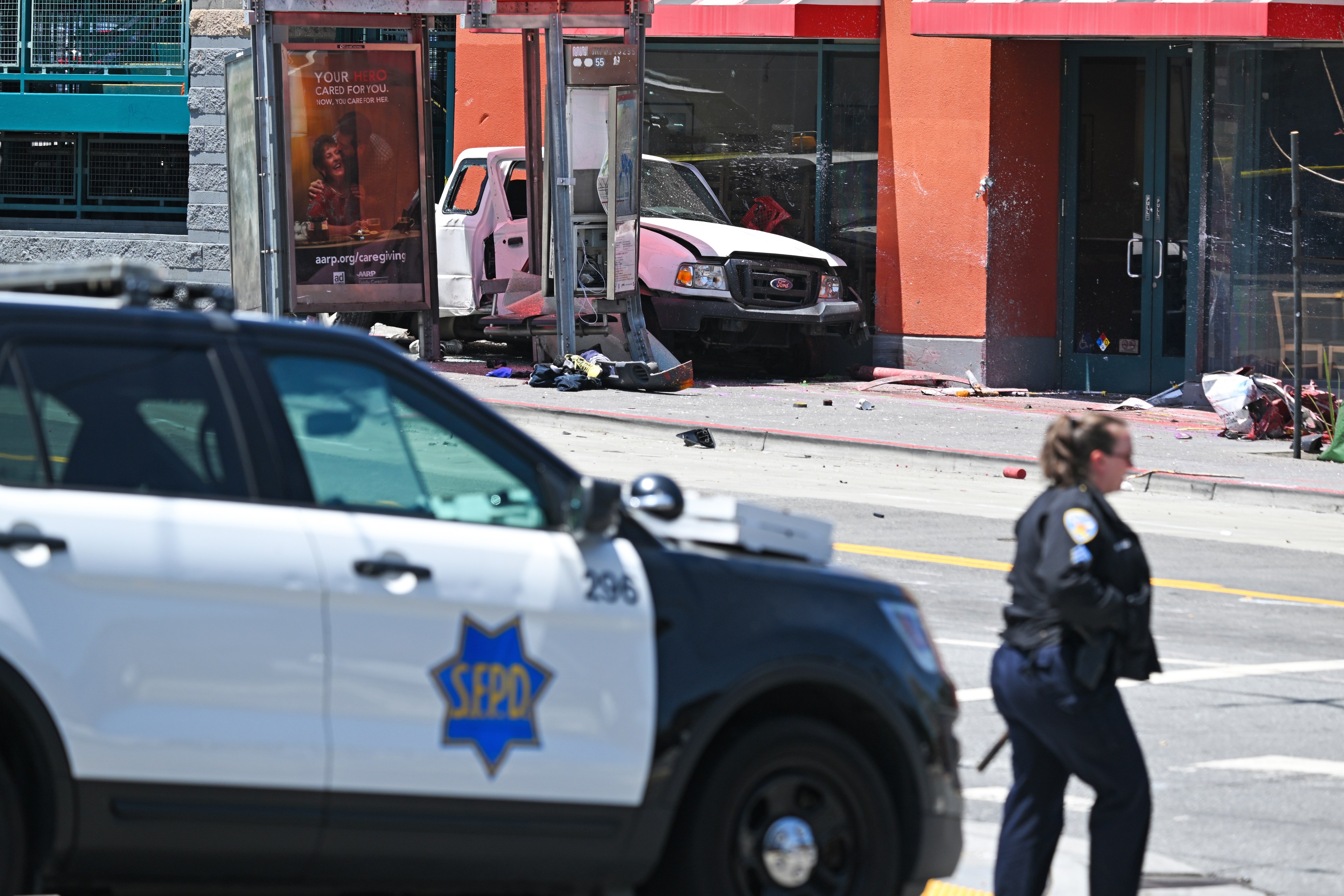A bystander killed at a bus stop. A pedestrian struck on the street. A police vehicle smashed through a vacant storefront.
This is some of the destruction seen during police chases in San Francisco last year.
Now new data, presented to the Police Commission on Wednesday night, shows the broader toll. More than a third of pursuits by the San Francisco Police Department in recent years led to a crash, according to the numbers obtained by the department from the California Highway Patrol, which keeps track of police pursuits around the state.
Fifty-seven, or 38%, of the 150 pursuits by San Francisco police resulted in a collision from 2018 until late last August, according to the figures, while 23, or 15%, of those chases involved a collision in which at least one person was hurt.
In all, 36 people were hurt and two were killed during the pursuits, the data shows. It’s unclear how many of those hurt or killed during the pursuits were suspects or bystanders.
The data was part of a discussion at the Police Commission about the rules for police chasing fleeing suspects in San Francisco. The civilian oversight panel called the hearing following a deadly pursuit last May, when a carjacking suspect fleeing from police officers and sheriff’s deputies struck and killed 58-year-old Victor Nguyen and injured three others near a bus stop.
While it’s unclear why, that collision is not reflected in the numbers released by the department.
“It’s undisputed that vehicle pursuits are dangerous for pursuing officers, bystanders and the person fleeing,” Janelle Caywood, policy director at the Department of Police Accountability, told the Police Commission.
Of the 12,513 pursuits carried out by law enforcement around the state in 2021, about 20% resulted in crashes, according to the most recent figures available that Caywood collected from the California Highway Patrol. At least one person was injured in 35% of those crashes, and someone died in about 2% of them, for a total of 52 deaths.
The discussion comes as Mayor London Breed asks voters to consider loosening the policy for when officers can engage suspects in vehicle pursuits so that they can chase fleeing suspects who are involved in property crimes. She has targeted the Police Commission with her proposal on the March ballot, saying that the civilian oversight panel has put reform ideology over public safety.
While several members of the Police Commission are opponents of Breed’s measure, called Proposition E, they were not allowed to discuss it during the hearing Wednesday because of city law barring them from engaging in political activity on city premises.
Currently, under the pursuit policy that the commission last updated in 2013, officers are allowed to engage in a car chase if a person is suspected of a violent felony, or when there is an “articulable reasonable belief” that a person poses an immediate public safety risk.
Breed’s measure would lower the threshold for when officers can chase someone to when they have reasonable suspicion that a “felony or violent misdemeanor” has occurred or is about to occur. The measure also seeks to give police access to new tools such as drones to aid with car chases, among other things.
A spokesperson for the Prop. E campaign said the measure would give officers broader discretion to pursue suspects without requiring them to engage in a chase. They could still decide to call off a pursuit that is deemed unsafe.
“Right now, criminals are breaking the law in brazen ways because they know the police can’t pursue them,” said the spokesperson, Joe Arellano. “By removing this blanket ban, we can eliminate this restriction and make people think twice about committing a crime because they will know that the police might apprehend them.”
San Francisco loosening its rules for police chases would buck the trend seen in other major cities that have moved toward more restrictive chase policies in recent years, according to a survey by the Department of Police Accountability, which investigates citizens’ complaints against officers and recommends police policy.
Since 2013, the survey found that police in cities such as Boston, Detroit and Baltimore have limited pursuits to cases where fleeing people are suspected of violent felonies or pose a threat to public safety. At the same time, the survey also found the Los Angeles police have a broader chase policy that allows pursuits for misdemeanors and felonies—with some conditions—and pursuits by New York police skyrocketed last year, according to local news reports.
Caywood, who conducted the survey, said that San Francisco’s current police pursuit rules were not dissimilar from the others she looked at.
“I think there’s been some misinformation that it’s crazy restrictive, and that’s just not what I found in my research,” Caywood said.
But Caywood said that police could consider new tools that may reduce the need for pursuits such as drones or GPS launchers, though he granted that they may raise civil liberties concerns.
Since San Francisco police do not have helicopters, Police Chief Bill Scott said that drones would be a “huge” help for the department when it comes to tracking suspects in a slow-speed pursuit or setting up a perimeter after a pursuit has ended in a collision, for instance.
“I think they could be very effective,” Scott said.
His department last year started the process to gain approval from the Board of Supervisors to use drones, but Scott said the proposal was currently “on hold.”
Scott said his top brass has also previously discussed securing GPS launchers, such as the vehicle-mounted ones offered by the firm StarChase, but has not gone further than that. He said he believes the launchers could be helpful in tracking a fleeing vehicle.
The commission is not currently considering a specific proposal for revising the pursuit policy.
